FSA announces 12-speed K-Force WE Disc groupset, budget power meter and E-bike System
Semi-wireless electronic shifting groupset gains a sprocket and design updates
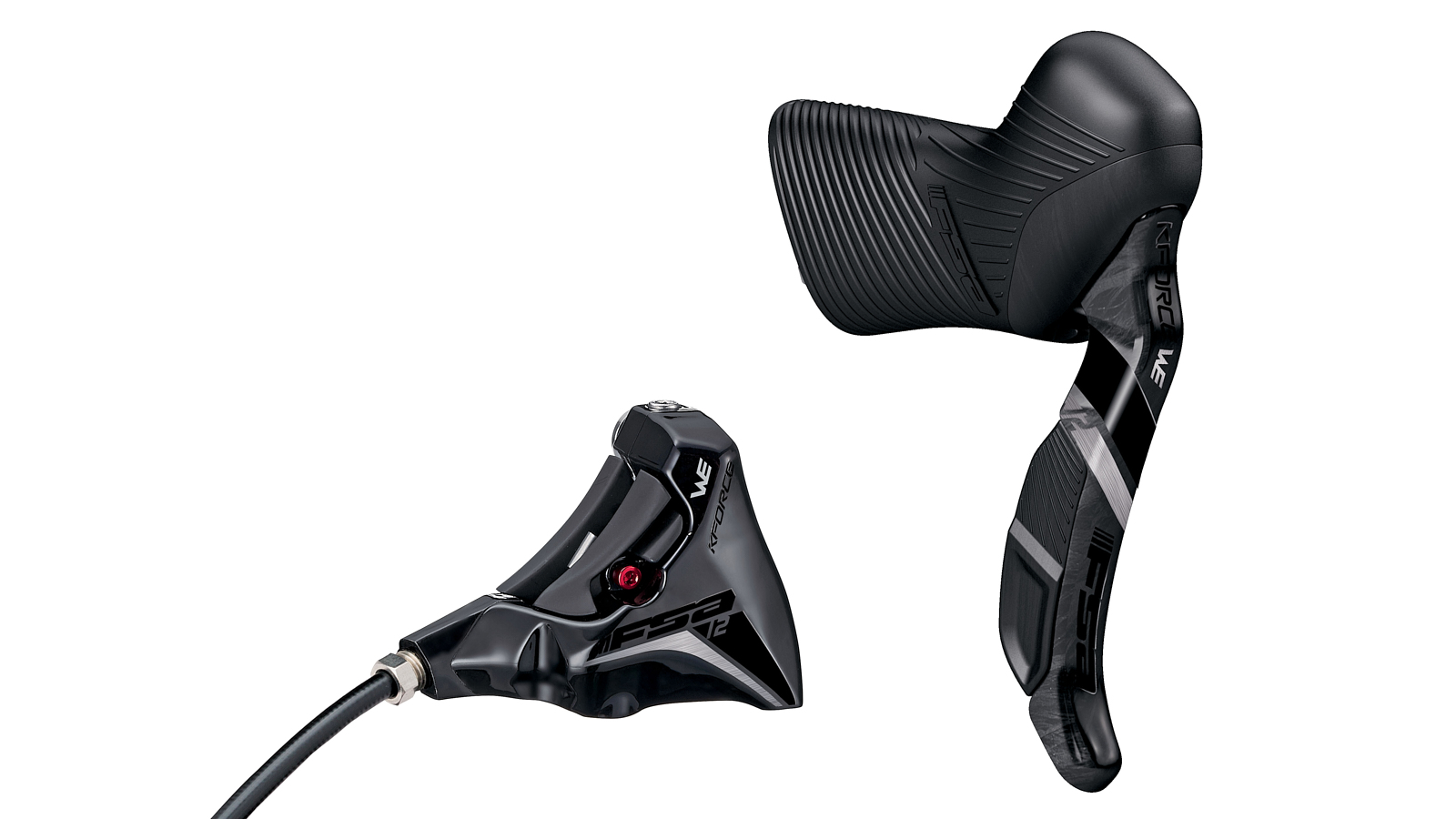
It’s been more than four years since FSA launched its 11-speed K-Force WE (wireless electronic) groupset, and less than two years since the release of its disc brake version. But today, the company has announced it's making the step to 12-speed with the K-Force WE 12 disc-only groupset. Naturally, it looks to build on the achievements of the previous iterations and compete directly with 12-speed electronic road bike groupsets from the big three – Shimano, SRAM and Campagnolo.
But that's not all. The groupset comes alongside a hoard of simultaneous product launches from the brand, across road, mountain, gravel and e-bikes.
K-Force WE 12-speed
Described as a 'renewed drivetrain' by FSA, most of the K-Force WE 12 components closely resemble the current 11-speed ones, but as well as the step up to 12 sprockets, there are some design and finishing tweaks to improve functionality and aesthetics.
The WE groupset has wireless shifters, which transmit shifting instructions to the control module atop the front derailleur. Both derailleurs are physically connected to a seat-tube-mounted battery, meaning the groupset isn’t totally wireless, but instead dubbed by many as semi-wireless.
Carrying forward the existing, well-received ergonomics, the shifter’s body, kinked brake lever and shift buttons look largely unchanged externally, except for new, more subtle graphics. The same is true for the disc caliper, while the shifter retains its compact master cylinder, reach adjustment of the composite lever blade, top-mounted bleed port and CR2032 coin cell battery-powered wireless transmission.
Claimed weight for each shifter and caliper, including brake hose and oil is 405g, 33g and 47g heavier than the company’s claimed weights for the 11-speed WE Disc right and left shifters respectively. The previous weight was without brake pads, but the provided weight for the new calipers doesn’t mention them.
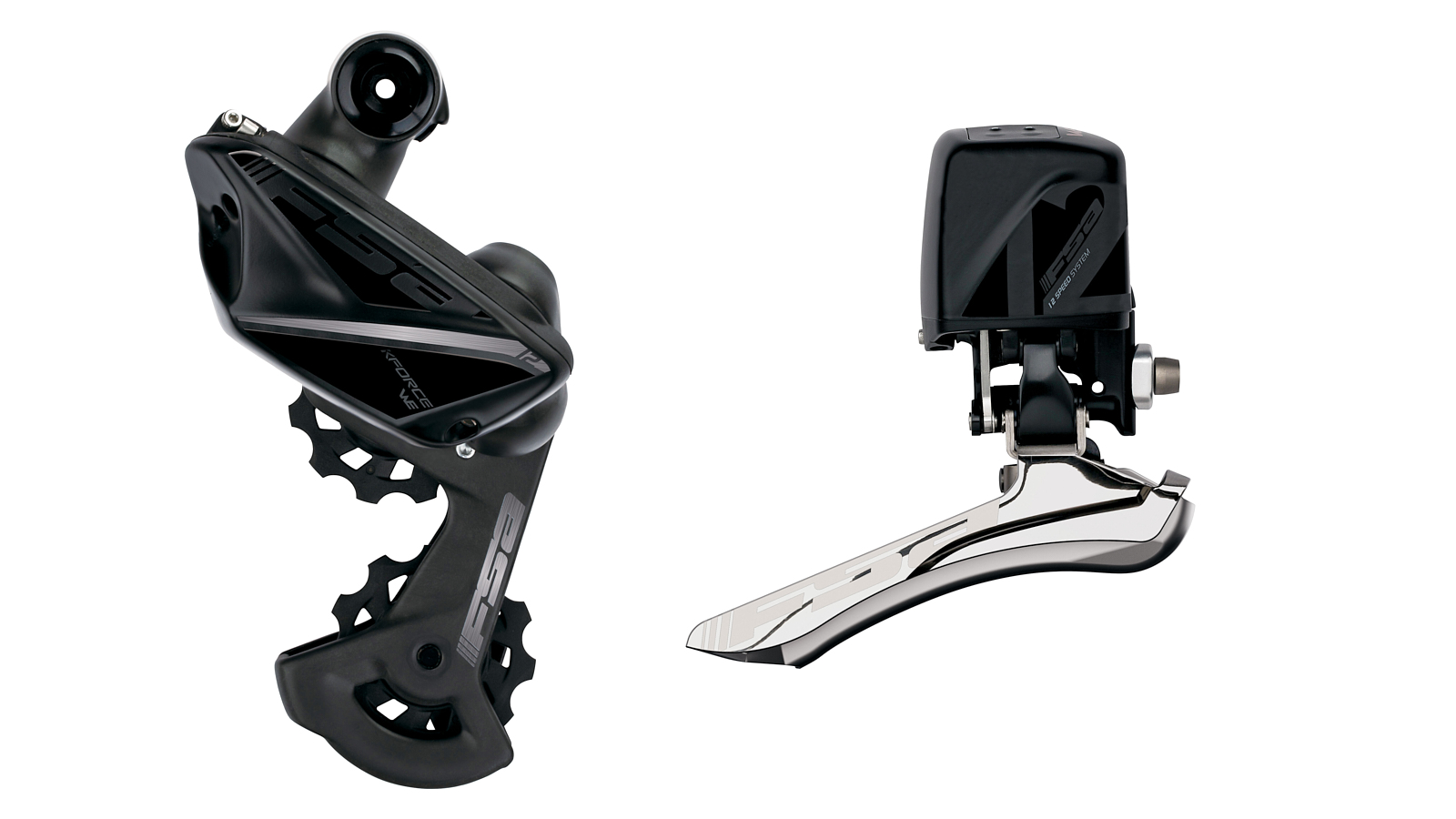
The new rear derailleur only seems to differ from the 11-speed version in finish and weight, with new stealthy graphics and an additional 24g. It still features a 32t maximum capacity, and FSA’s gram-saving composite pulleys, and presumably still does away with a return spring, operating more like a robotic arm than a traditional parallelogram rear mech.
Get The Leadout Newsletter
The latest race content, interviews, features, reviews and expert buying guides, direct to your inbox!
The front derailleur remains the brains of the operation, in that it receives the wireless signal from the shifters, and controls the entire shifting element of the system.
It fits standard braze-on mounts, retains its auto-trimming function, and has a claimed 70-millisecond shift time. In a departure from the 11-speed version’s maximum chainring capacity of 16 teeth, the 12-speed model states 16-19 teeth. Its tall, oversized body looks identical, save for an understated ‘12’ graphic, but the steel cage has been refined, with the obvious screw at the rear end no longer visible. Claimed weight has dropped from 162g to 159g.
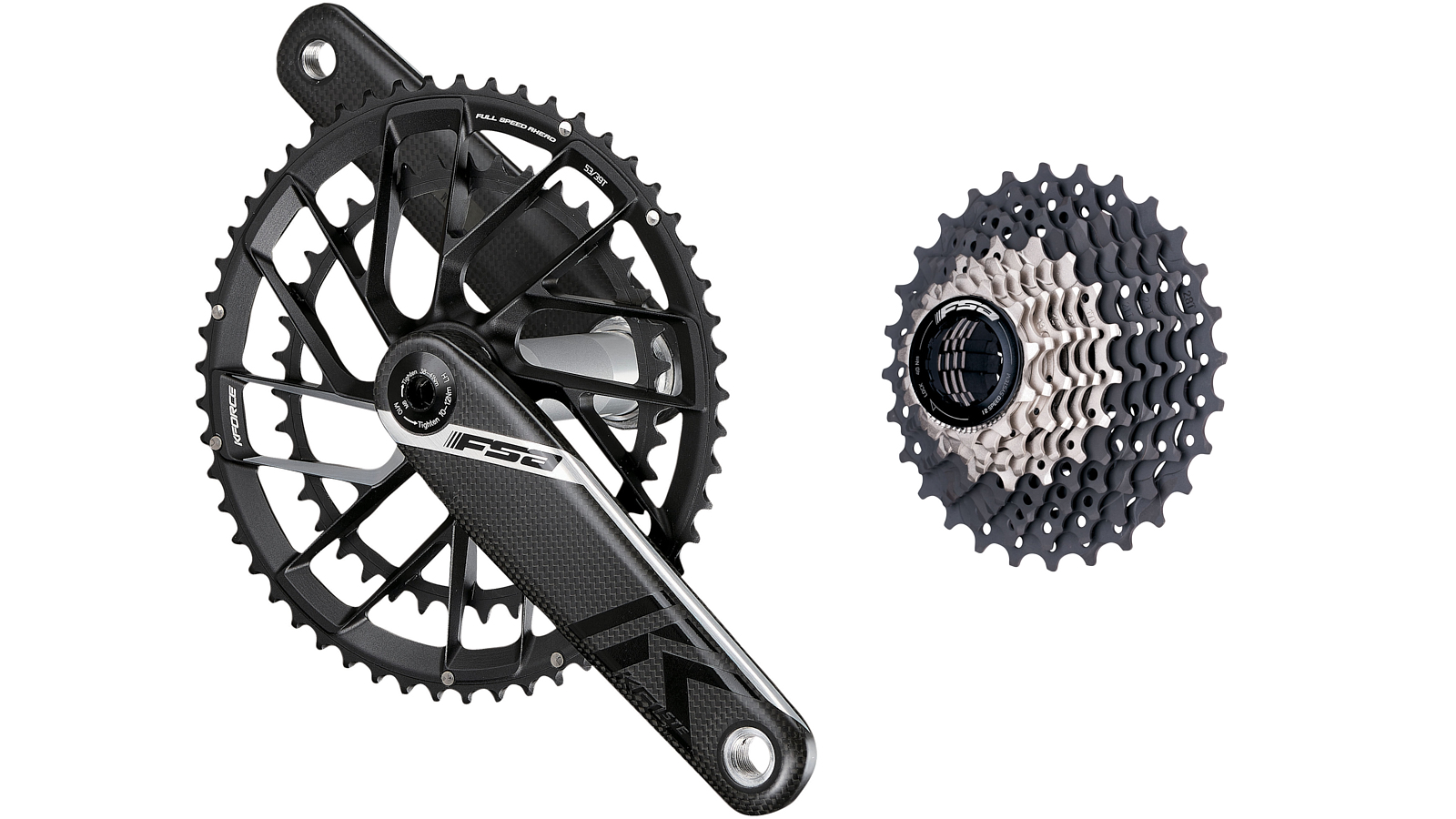
Paired with the new WE 12-speed groupset, FSA has paired its K-Force Team Edition BB386 Evo crankset. Much more aesthetically pleasing than the earlier K-Force crankset, it has hollow 3K carbon fibre composite cranks and one-piece, direct mount CNC AL7075 chainrings.
FSA claims the black anodised, bead-blasted chain rings are compatible with 11- and 12-speed Shimano, SRAM and FSA drivetrains. The BB386 EVO axle is 30mm diameter alloy, with a range of FSA bottom brackets ensuring wide compatibility.
Available crank lengths are 165mm, 167.5mm, 170mm, 172.5mm and 175mm, with chain rings available in 54/40, 50/34, 46/30 combinations. Claimed weight with 54/40 rings is 544g.
The single greatest visual change to FSA’s K-Force WE groupset is its additional sprocket. The cassette is still constructed with a one-piece cast, heat treated carrier, and the largest sprockets are electroless nickel plated. The smaller sprockets are titanium, and cassettes will be available in 11-25, 11-28 and 11-32 sizes. FSA claims the weight of its new 12-speed cassette in 11-32 to be 195g, which is significantly lighter than the previous 257g 11-speed 11-28 cassette.
The K-Force chain is described by FSA as quiet and efficient, with hollow pins, 5.6mm width and a nickel plated finish, a 116 link chain is claimed to weigh 250g, compared to 246g for a 114 link chain before.
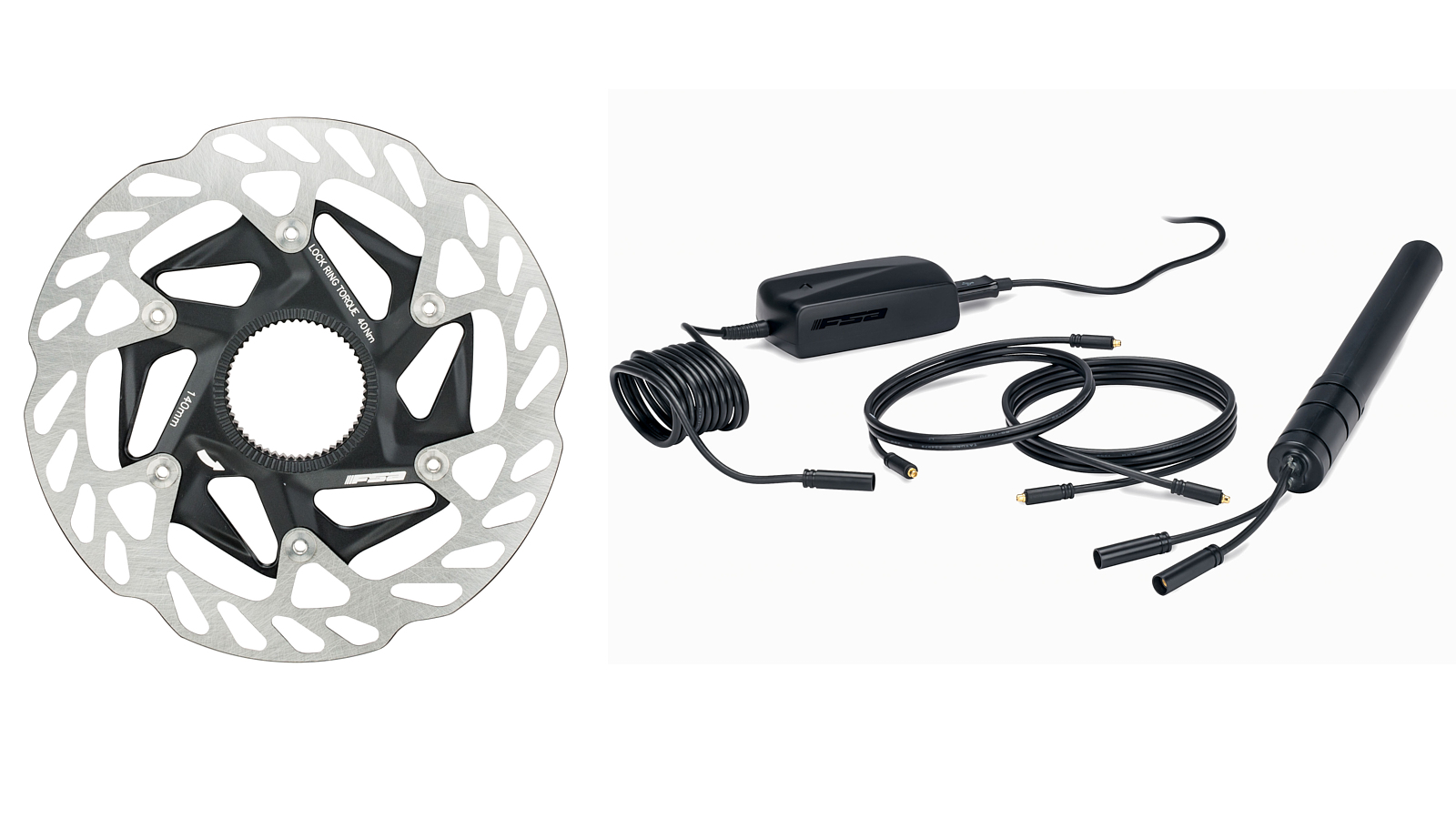
The K-Force WE rotor features a two-piece rotor design with forged aluminium carrier, ground stainless steel ring and rounded edges, for centrelock or six-bolt hubs, and in 160mm or 140mm diameters. Their claimed weights have increased marginally from 100g and 120g, for 140mm and 160mm respectively, to 103g and 125g.
Elsewhere, the internal seat tube mounted 1100 mAh battery powers both derailleurs via linked wires, and should offer similar, or improved usage time between charges. The original WE system needed to be switched on from a button on the front derailleur before use, and would go into standby mode after a period of inactivity. Charging was previously carried out by replacing the front derailleur wire with the charger. Although the battery and wiring looks unchanged, there is currently no information regarding this process, or expected battery life.

FSA Powerbox SC Pod Power Meter
Also released today is FSA’s new power meter is based on a cold forged AL6061/T6 aluminium crankset, with a MegaExo 24mm or BB386 EVO axle. The chainrings are stamped AL7075 aluminium, and available in a huge variety of 10, 11 and 12 speed options to suit Shimano, SRAM and FSA drivetrains, although FSA says it’s optimised for 11 and 12 speed.
The cranks come in lengths from 145mm to 175mm, with 5mm jumps, except for 167.5mm and 172.5mm. It’s polished anodised black, with a claimed weight of 793g in 46/30, 170mm configuration.
The power measuring system is a truly international affair, using Japanese strain gauges, calibrated by a German torque sensor. It offers virtual left/right balance, is Zwift compatible via BLE 5.0, with ANT transmission, is IPX7 waterproof and has automatic temperature compensation. The power meter’s claimed battery life is 450 hours, using a single CR2450 coin cell, with an accuracy said to be +/- one per cent. All this for an expected retail price of just €385.
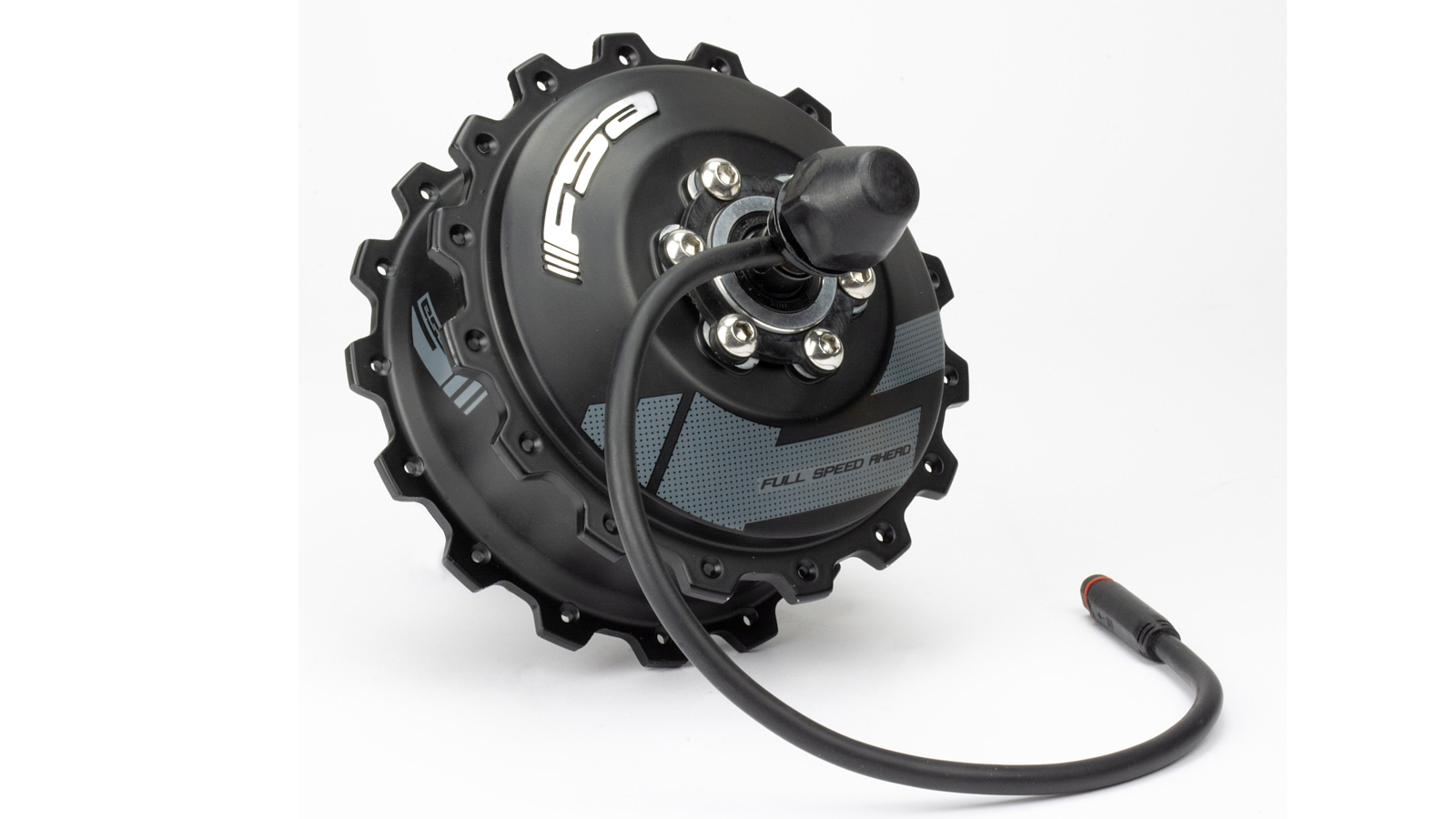
FSA E-Bike System
The new FSA System, or E-System, is a rear hub electric-assist motor with a potential total of 504wH, plus an integrated on-bike control unit and smartphone app. FSA has focussed on flexibility and integration, with a 252Wh battery that’s designed for down tube fitment, and an extra 252Wh battery that can be fitted into a bottle cage to double the range. A top tube button controls the system, and a charging port is intended to sit just above the bottom bracket shell.
The batteries power a 43Nm hub motor, which FSA chose because of its ability to slot into almost any frame, regardless of size. It weighs 2.4kg, and is said to have very low friction at speeds over 25kmh. There’s a fast-reacting integrated torque sensor, remote dealer diagnostics function, and FSA claims good waterproofing, long bearing life and easy maintenance. There are five assistance levels, and an FSA app compatible with iOS and Android devices, enabling riders to record their riding data, display battery status and show turn-by-turn GPS navigation.
At speeds greater than 25kmh, or 32kmh for the USA, the hub motor shuts down and allows the rider to continue pedalling with minimal residual friction, providing a natural ride feel. FSA’s E-System is also compatible with Garmin’s E-bike Remote, which can remotely operate your bike’s assistance functions, as well as your Garmin Edge, and potentially another ANT+ connected third option.